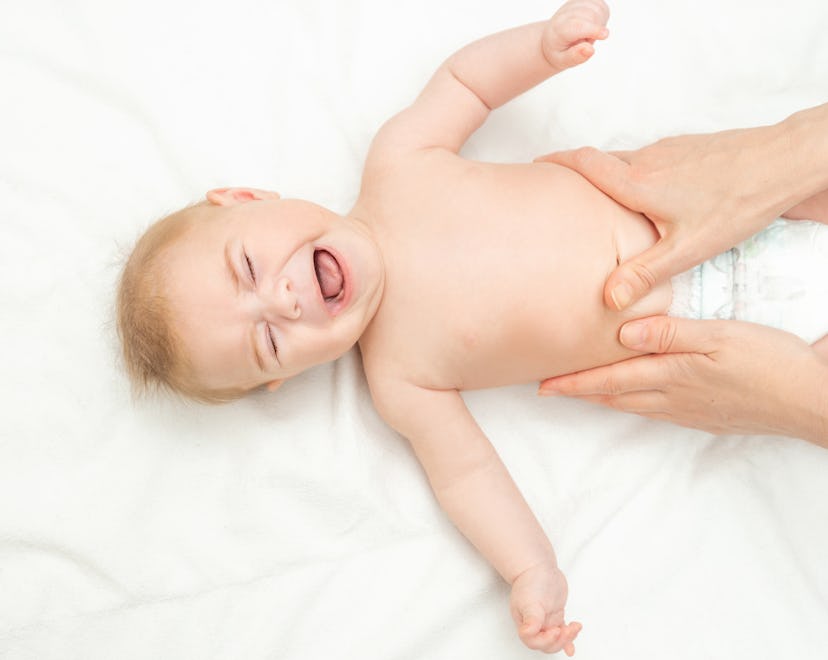Baby

So Here's Why Your Baby Farts So Much
Sometimes, it's just too much tooting.
It’s after the umpteenth feeding of the day, and you’re looking lovingly at your newborn snoozing happily in your arms. That little button nose, that beautiful bald head — your little one is simply perfection. And then, in the middle of a hazy, hormonally-induced lovefest, your little nugget lets a very loud one rip. Again. You might ask yourself, “Why does my baby fart so much?” Maybe your gassy little guy or gal needs some assistance.
Is Your Baby Really That Gassy?
If you think your babe boops all the time, you’re not wrong. Babies fart — a lot. “Gas is normal in all people, babies included,” Dr. Alexander Perelman, MD, DO, MS, a board-certified gastroenterologist tells Romper. “It is just air trapped in the GI tract that needs to come out, and most people pass gas as much as 25 times throughout the day.” According to a PubMed study, gastrointestinal gas can be upsetting, not just for your baby’s tummy, but for you, too. After all, seeing your child squirming and uncomfortable (and yes, farting, too) can be distressing, and couple that with the additional belly bloat and distension, it can be downright sad to see your child potentially suffering.
What Causes Extra Gas In Babies?
When your baby is farting and fussy, it can be nerve wracking to figure out what’s causing your little one to break wind. But depending on their age, kids can get gassy for a variety of reasons, Dr. Whitney Casares, M.D., M.P.H., F.A.A.P., author of The Working Mom Blueprint: Winning at Parenting Without Losing Yourself tells Romper. “Babies generally have immature digestive systems, which can cause gassiness,” says Dr. Casares. “Also, they often swallow a lot of air while they are eating, especially if there is fast letdown when breastfeeding or if they are drinking from a fast flow bottle.” Some babies can also have sensitivities to formula or to components in breastmilk related to their mom's diet, Dr. Casares says, which can cause your child to cut the cheese more frequently. Additionally, your baby might be gassy because of a blockage. Says Dr. Perelman: “Gassiness can also be indicative of some constipation, a food that doesn’t agree with their young GI tract, or potentially a sensitivity to something in the diet.”
Can Excessive Gas Be A Problem For Your Baby?
Apart from some potentially embarrassing moments (like your baby letting out a bottom burp while you’re on the line at Target), passing gas is completely normal. But there might be times in which it becomes an issue. “Excessive gas can be a problem if it makes your baby excessively fussy or if it seems to cause pain for your baby,” says Dr. Casares. But there are red flags to watch out for that might require a trip to the pediatrician. “If your baby fails to gain weight, or if there is projectile vomiting, blood in their stool, or if they’re lethargic during a feeding, you should consult your doctor right away,” says Dr. Perelman.
Does Gassiness In Babies Go Away On Its Own?
So, here’s the good news. Your baby should stop booping so much by the time they’re ready to start sitting on their own. “Excessive gassiness generally resolves at about 4-6 months of age, once a baby's gut starts to mature,” says Dr. Casares. Adds Dr. Perelman: “Many kids outgrow the excessive gas phase as their diets stabilize into toddlerhood, but in the meantime dietary adjustments, position during feeds, and even a little simethicone (an anti-gas medication) can be helpful, but most importantly the guidance of a good pediatrician.”
Here’s How You Can Prevent A Gas Buildup In Your Baby
If you’re finding baby’s farting to be frustrating (for both of you), there are some things you can do to decrease the gassiness. Keep in mind that there isn’t a one-solution-fits-all answer, since you have to specifically address the factors causing your kiddo’s farting. “It can be helpful to monitor your child’s diet with a journal to see if anything correlates with times the baby is extra gassy,” suggests Dr. Perelman. “If something is identified, it can be best to expose them in smaller quantities to see if they can tolerate that better.” And be sure to always burp Baby in between and after meals — you might even want to keep your baby upright (instead of lying them down) for about 20 minutes after a feeding to prevent any swallowed air from becoming a future fart.
If you’re looking for ways to prevent your baby from tooting all the time, well, it’s almost impossible. Babies pass gas all the time, and usually, it’s completely normal. But if your baby doesn’t seem like themselves (or if there’s blood in their stool or if it’s really hard), you should speak to your child’s pediatrician to ensure that their gassiness is just hot air — and nothing worse.
Study cited:
Sferra, T., Heitlinger, L. “Gastrointestinal gas formation and infantile colic” 1996.
Experts:
Dr. Alexander Perelman, MD, DO, MS, a board-certified gastroenterologist
Dr. Whitney Casares, M.D., M.P.H., F.A.A.P., author of The Working Mom Blueprint: Winning at Parenting Without Losing Yourself
This article was originally published on